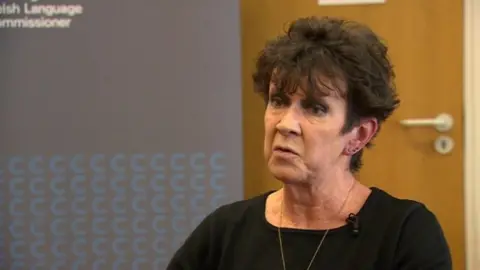Welsh language standards in universities 'challenging'
 BBC
BBCImplementing Welsh language standards will be a "challenging journey" for universities and further education colleges in Wales, according to Welsh Language Commissioner Meri Huws.
From the beginning of April, students will have legal rights to use the Welsh language for the first time.
Among these are rights to a personal tutor who speaks Welsh.
Others include a counselling service, and correspondence such as letters, forms and prospectuses in Welsh.
The language standards, introduced in 2016, already require councils, police forces, fire and rescue services, national parks and the Welsh Government to provide some services bilingually.
Meri Huws said implementing the standards in universities and colleges would not happen overnight.
"This is a journey, it's a challenging journey, it's an exciting journey and I think I should really, really commend the universities and the further education colleges for being prepared to go on that journey," she said.
"Yes, they will have to look at recruiting and training counsellors who can work through the medium of Welsh.
"They will have to change some of their systems, but I've been really, really pleased by their response and how prepared they are to actually engage with us and work with us to make sure that the experience for students is a really positive one."
On average 169 standards will be introduce on 25 educational establishments and will have to be implemented by 1 October 2019.
The language standards now apply to about 100 public bodies in Wales.

Cardiff Metropolitan University is among those preparing for the changes.
Daniel Tiplady, head of its Welsh language unit, said: "There has been an additional financial cost to us, we've been planning for it for two years so we've absorbed that cost centrally.
"Rather than look at it as a negative, as a cost issue, we've been looking more at the benefits this will bring to the university.
"We're confident that it will bring additional Welsh-speaking students to us, it will increase student satisfaction and retention amongst the Welsh-speaking students that we have, and one of the additional benefits that it's brought to us as a university, we've re-looked at the way we communicate with students. We've looked at the documentation we offer them and we've simplified it."

Liam Ketcher, a student at Cardiff University, said the new rights were a really "positive change".
"It'll make it easier for me to study a course bilingually or fully through the Welsh language," he said.
"With these standards hopefully every student will be able to submit course work and sit exams through the medium of Welsh without giving the uni prior notice.
"In terms of what the university doesn't do at the moment, I think the counselling one is really important because it is a sensitive subject but you need to make sure that the individuals offering that service are trained."
Jacob Morris, the university's Welsh language officer, said the new rights could be difficult to police but said he would expect the commissioner and the Welsh Government to put pressure on the university to follow the requirements.
"It's a massive encouragement for us students here at Cardiff to know that we have legislative backing and that stance the Welsh Government is taking is making me feel a lot more confident in my studies," he said.
Osian Morgan, president of Cardiff's Welsh Students' Union said: "I think all Welsh speaking students welcome the rights but to be fair most of the things are things the university and universities across Wales are already offering.
"The main difference now with the standards is that we've got legislative support with that."
